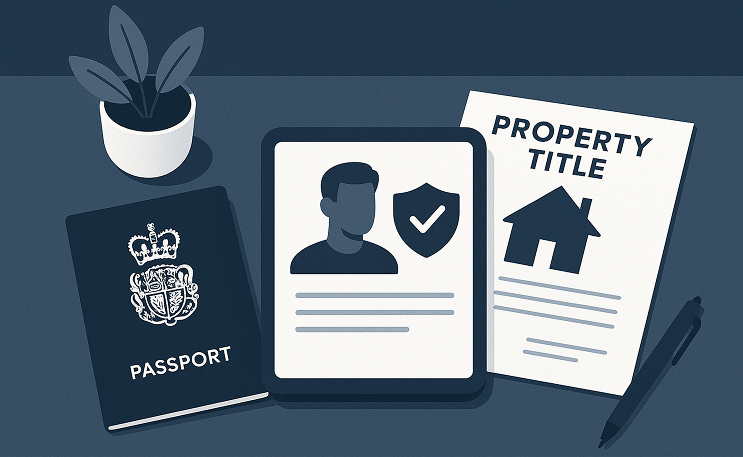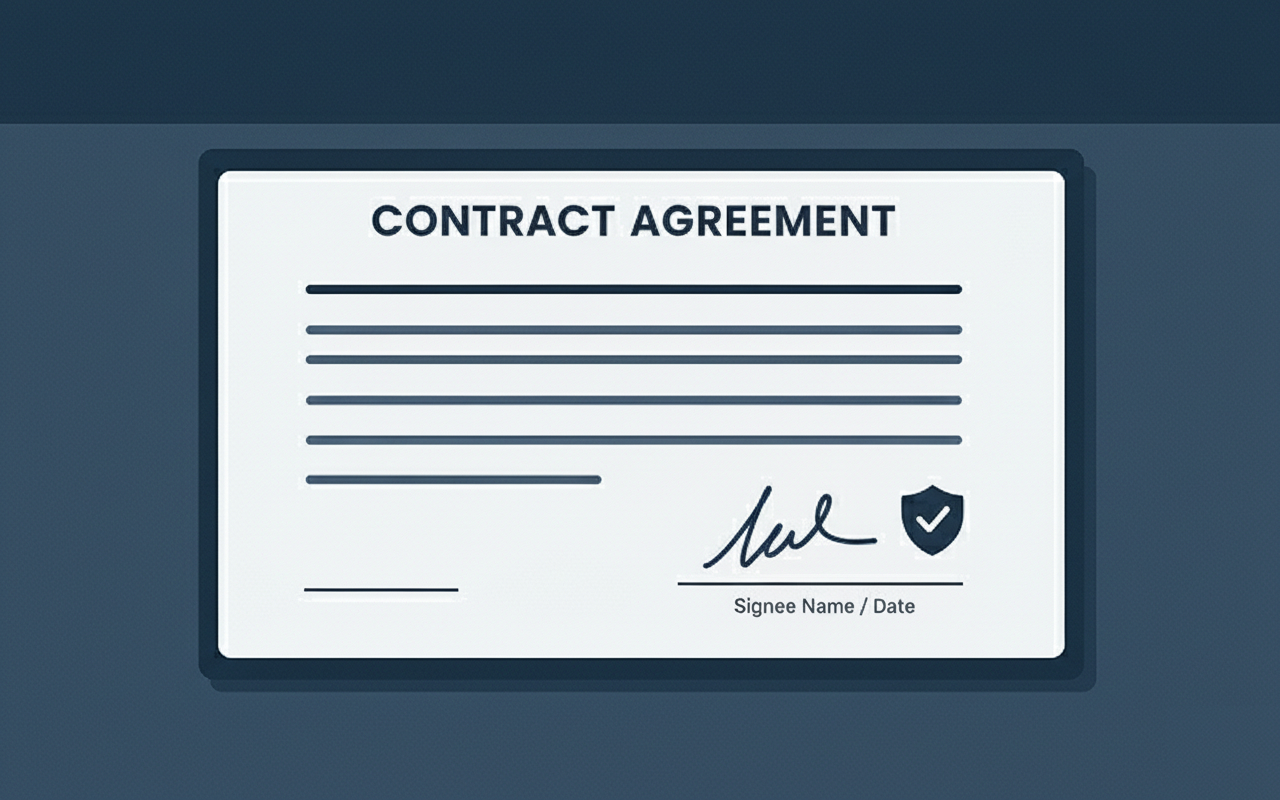
How to Verify Identity for Property Transactions
Buying property in the UK requires secure identity verification to prevent fraud and meet legal requirements. Digital methods, now widely used, are faster and safer than traditional paper-based checks. Key points:
- Why it matters: Identity verification protects against fraud and ensures compliance with anti-money laundering (AML) and Know Your Customer (KYC) laws.
- Legal standards: HM Land Registry introduced a digital identity standard in March 2025, requiring biometric and cryptographic checks.
- Methods: Options include manual checks, digital platforms like Veyco, or hybrid approaches combining both.
- Documents needed: Passports, driving licences, or biometric residence permits, with additional documents for address verification if required.
- Fraud prevention tips: Use secure communication, verify bank details independently, and stay vigilant for suspicious activity.
Digital platforms like Veyco streamline the process, combining identity checks with AML and fraud screening, reducing human error and delays.
Documents Required for UK Identity Verification
Step-by-Step Guide to Identity Verification
When it comes to property purchases, verifying identity is a crucial part of the process. It involves collecting the necessary documents, choosing an appropriate verification method, and adhering to strict timelines.
Acceptable Forms of Identification
The foundation of identity verification in property transactions lies in providing valid, government-issued documents. In the UK, the most commonly accepted forms of identification include:
- Passports: A universally recognised form of identification. Both UK and foreign passports are typically accepted, with digital systems often used to verify their embedded security features.
- Driving Licences: Full UK driving licences are widely accepted. However, provisional licences might require additional documentation to support them.
- Biometric Residence Permits: For non-UK nationals, these permits provide a secure way to verify identity by incorporating biometric data.
If the primary document alone isn’t sufficient, additional documents, like recent utility bills, bank statements, or council tax bills, can help confirm an individual’s address.
Once the required documents are in place, the next step is to decide on the most effective method for verification, depending on the transaction’s complexity.
Verification Methods
There are several ways to verify identity in property transactions, each offering different levels of control and efficiency:
- In-house Verification: Conveyancers can carry out manual checks internally, which allows them to oversee every stage of the process.
- Digital Verification Platforms: These platforms simplify the process by automating tasks like document checks, biometric matching, and cross-referencing with official records. Companies like Veyco provide secure and efficient digital solutions tailored to modern property dealings.
- Hybrid Approaches: For more complex transactions, such as those involving multiple parties or unusual circumstances, a combination of digital tools and manual checks can be particularly effective.
Typically, the verification process involves capturing images of documents, verifying biometric data, and cross-referencing details with official databases.
After selecting the verification method, it’s important to ensure the process aligns with the required timelines.
Timelines and Deadlines
Sticking to deadlines is essential in identity verification. Digital methods can often speed things up, but the time required may vary based on the transaction’s complexity.
While standard procedures are designed to be efficient, cases involving overseas buyers or additional parties may need extra time. To avoid delays, aim to complete all verifications well before registration deadlines.
For urgent cases, digital platforms can often provide quick preliminary results while completing the more detailed checks in the background.
Using Digital Platforms for Identity Verification
Digital platforms have revolutionised how property professionals manage identity verification. These tools make the process quicker, safer, and compliant with UK digital standards, providing a seamless experience for both professionals and clients. By using advanced biometric and cryptographic methods, conveyancers can now conduct checks that are both thorough and efficient, paving the way for platforms like Veyco to elevate the process further.
Key Features of Veyco

Veyco is designed specifically for UK property transactions, offering a secure, all-in-one platform for identity verification, Qualified Electronic Signature (QES) onboarding, and document signing.
The platform validates secure documents such as biometric passports, EU/EEA biometric ID cards, and UK biometric residence permits. These documents include electronically stored photos, which are used for biometric facial recognition. Veyco employs Near Field Communication (NFC) technology to read the document's chip, verifying its digital signature, confirming the signing key, and extracting biometric data. It then matches this data with the individual's live biometric information, using liveness detection and anti-spoofing measures to ensure accuracy, all in line with HM Land Registry's standards.
Most identity checks on Veyco are completed in under 10 minutes, and its mobile-friendly design works across all devices. The platform prioritises security with bank-grade encryption and secure data storage, ensuring that only the requesting solicitor or agent has access to the information. Veyco operates independently, meaning data is never reused or shared beyond the requesting firm.
Beyond identity verification, the platform also includes fraud screening and source of funds checks, ensuring compliance with UK regulatory standards. For added support, users have access to real, UK-based human assistance to help meet compliance requirements.
Veyco is "POWERED BY ONFIDO", integrating advanced AI-driven tools such as facial recognition, document verification, biometrics, and liveness detection. This hybrid approach combines automated processes with human oversight to deliver a reliable and secure service.
Benefits of Digital Identity Verification
Digital identity verification platforms bring clarity and confidence to conveyancers, significantly reducing the risk of human error in document checks. They save time and boost efficiency, Veyco, for example, completes most checks in under 10 minutes. Automated systems validate the cryptographic signatures embedded in identity documents, ensuring a secure and reliable process. With its mobile-friendly interface, clients can complete verification remotely, blending convenience with robust fraud prevention measures that align with regulatory standards.
Anti-Money Laundering (AML) and Source of Funds Checks
Anti-Money Laundering (AML) and source of funds checks, as required by the Proceeds of Crime Act 2002 and Money Laundering Regulations 2017, are essential safeguards in property transactions. These checks protect buyers and sellers from unknowingly becoming involved in financial crime. When paired with digital identity verification, they create a secure and reliable framework for transactions.
Given the large sums often involved in property deals, these transactions can become a target for illicit activities. Without thorough checks, professionals risk facilitating money laundering, which can lead to severe legal and financial consequences.
Conducting AML and Source of Funds Checks
The process starts with customer due diligence (CDD). This involves verifying the client’s identity, assessing potential money laundering risks, and maintaining vigilance throughout the transaction. For clients considered higher risk, such as politically exposed persons (PEPs) or those from high-risk countries, enhanced due diligence measures are applied.
Clients must provide evidence of the legitimate source of their funds. This could include bank statements, inheritance documents, or, for cash-heavy businesses, records like trading accounts or audited financial statements. Corporate clients may need to supply additional paperwork, such as company formation documents, beneficial ownership registers, and board resolutions authorising the transaction.
A thorough risk assessment is vital. Property professionals should evaluate factors like the client’s background, the complexity of the transaction, geographical risks, and any unusual circumstances. Warning signs might include unwillingness to share required documentation, transactions involving multiple jurisdictions, or purchases that far exceed the client’s apparent financial capacity.
Ongoing monitoring is equally important. Professionals should stay alert to changes in a client’s circumstances or transaction patterns that could affect the initial risk assessment. This vigilance ensures potential risks, such as money laundering or terrorist financing, are identified early. By following these steps, professionals can lay the groundwork for automated, streamlined AML processes.
Integration with Veyco
Veyco takes AML and source of funds checks to the next level by integrating them into its digital identity verification platform. This approach combines identity verification and AML screening into a single, secure system.
The platform’s fraud screening tools automatically cross-check client information against sanctions lists, PEP databases, and adverse media sources. This helps flag any potential issues requiring further investigation or enhanced due diligence.
With Veyco’s real-time verification, the delays often associated with manual AML checks are eliminated. Additionally, the platform maintains detailed audit trails, documenting all verification activities to ensure compliance during regulatory reviews. Its seamless integration with existing practice management systems also reduces administrative workloads, ensuring all checks are completed efficiently before moving forward with a transaction.
Best Practices for Fraud Prevention in Property Transactions
Keeping your property transactions secure is essential to safeguard your investment, reputation, and legal compliance.
Practical Fraud Prevention Strategies
Fraud prevention in property transactions demands vigilance and a multi-layered approach. Here are some effective strategies:
- Multi-layered identity verification: Rely on multiple forms of identification, such as government-issued photo IDs and proof of address. This extra step makes it harder for fraudsters to use false identities.
- Use secure communication channels: Avoid sharing sensitive information over unencrypted emails or text messages. Instead, opt for encrypted, end-to-end secure platforms. If you need to share verification codes or other private data, confirm receipt using a separate, secure method.
- Face-to-face or video verification: For high-value transactions, video calls can be a reliable way to confirm someone’s identity by matching their appearance to the provided documents.
- Independent verification of bank details: Always verify bank account information through a separate, trusted channel before transferring funds. Be particularly cautious of unexpected changes to bank details, as these can signal fraud.
- Authenticate documents thoroughly: Don’t just rely on a quick visual check. Verify documents with the issuing authorities and inspect for security features like watermarks or holograms to ensure authenticity.
- Stay updated on security protocols: Regularly update your systems and security measures. Have clear procedures in place for handling suspicious activity, ensuring swift action when necessary.
These strategies provide a solid foundation for fraud prevention, but they can also be tailored to specific circumstances for even greater effectiveness.
Comparison of Verification Approaches
When it comes to fraud prevention, the choice of verification methods can make a big difference. Understanding the strengths and limitations of traditional and digital approaches helps you decide what works best for your needs.
- Manual document review: While thorough, this method can be slow and prone to human error, especially in high-volume transactions.
- Digital verification: This approach speeds up the process and reduces manual mistakes, making it a more efficient option for most scenarios.
- Hybrid approach: For high-risk or complex transactions - such as those involving overseas clients or intricate ownership structures, a combination of digital tools and selective manual checks often provides the best results.
Tailor your verification process to the specifics of each transaction. For example, high-value purchases or international deals may require additional layers of scrutiny, while straightforward domestic transactions might allow for a more streamlined approach.
Conclusion and Key Takeaways
Protecting your property transactions starts with proper identity verification. It safeguards your investment and ensures you stay on the right side of the law. In the UK, where the property market operates under strict verification standards, understanding the legal framework and adopting strong fraud prevention measures is essential.
Thanks to digital platforms, identity verification has become more efficient. Tools like Veyco simplify these checks with features such as bank-grade encryption and integrated Anti-Money Laundering (AML) screening, making the process faster and more secure.
The best verification systems use a layered approach. This means combining multiple checks, secure communication channels, and thorough document authentication. Whether you're handling a simple domestic purchase or navigating the complexities of international transactions, a robust system ensures compliance with the Money Laundering Regulations 2017 and protects all parties involved.
Veyco stands out by offering a comprehensive solution that includes AML checks, source of funds screening, and qualified e-signatures, all through a user-friendly, mobile-accessible platform.
Tailoring verification methods to the risks of each transaction is key. High-value purchases or international clients might need extra scrutiny, while standard domestic deals can benefit from streamlined digital processes. By using secure platforms and thorough protocols, you lay the groundwork for smooth, compliant transactions that protect everyone involved.
Latest Articles
